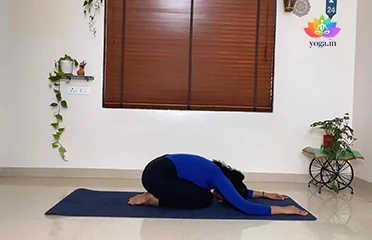Akarna Dhanurasana (Archer Pose)
अकर्णा धनुरासन / Archer Pose
The Sanskrit name is derived from Akarna (अकर्णा ) meaning towards [�K]
Anantasana (Sleeping Vishnu Pose)
अनन्तासन / Sleeping Vishnu Pose | Vishnu's Couch Pose
The Sanskrit name is derived from Ananta (अनन्त) meaning without end [�K]
Anjaneyasana (Crescent Moon Pose)
आंजनेयासन / Crescent Moon Pose
The Sanskrit name is derived from Anjane (आंजने) meaning Hanuman, [�K]
Astavakrasana (Eight-Angle Pose)
अष्टवक्रासन / Eight-Angle Pose
The sanskrit name is derived from ashta (अष्ट) meaning eight, Vakra [�K]
Bakasana (Crane Pose)
बकासन / Crane Pose
The Sanskrit name is derived from Baka (बक) meaning crane or Kaka (काक) [�K]
Balasana (Child’s Pose)
बालासना / Child's Pose
The Sanskrit name is derived from Bala (बाला) meaning child and āsana [�K]
- 5.0/ 5 1 Rating
-
Ignore it...
- Seated Pose
Bhairavasana (Formidable Pose)
भैरवासन / Formidable Pose
Bhairava (भैरव, Bhairava) is a manifestation of Shiva (शिव, Śiva); [�K]
Bharadvajasana (Seated Spinal Twist)
भरद्वाजसन / Seated Spinal Twist
The Sanskrit name is derived from Bhardvaja (भरद्वाज) means bringing [�K]
Bhekasana (Frog Pose II)
भेकासन / Frog Pose II
The Sanskrit name is derived from Bheka (भेका) meaning frog and asana [�K]
Bhujangasana (Cobra Pose)
भुजंगासन / Cobra Pose
The Sanskrit name is derived from Bhujanga (भुजंगा) meaning cobra [�K]
- 1
- 2
- 3
- 4
- 5
- ...
- 6
- 7
Yoga Poses for Abdomen: Relieve Discomfort and Improve Digestion
Yoga poses for the abdomen can greatly enhance core strength, improve digestion, and alleviate abdominal discomfort. Yoga can aid in treating and relieving abdominal issues by promoting healthy organ function, reducing stress, and enhancing muscle tone. Through targeted postures and breathing exercises, yoga can help balance the body and improve overall abdominal health.
Understanding Yoga Poses for the Abdomen:
Yoga poses for the abdomen focus on strengthening the core muscles, improving digestion, and relieving tension in the abdominal area. These poses engage the muscles of the abdomen, lower back, and hips, providing a comprehensive workout that supports overall health and well-being. Understanding these poses involves recognizing their role in enhancing core stability, digestive function, and abdominal comfort.
Key Factors Contributing to Abdominal Issues:
Several factors can contribute to abdominal issues, including:
- Poor Diet: Consuming unhealthy foods can lead to digestive problems.
- Lack of Exercise: Insufficient physical activity weakens core muscles and affects digestion.
- Stress: Chronic stress can disrupt digestion and cause abdominal discomfort.
- Dehydration: Not drinking enough water can lead to constipation and digestive issues.
- Poor Posture: Slouching or poor posture can strain abdominal muscles and organs.
Symptoms of Abdominal Issues:
Common symptoms associated with abdominal issues include:
- Abdominal Pain: Persistent or intermittent pain in the abdominal region.
- Bloating: Feeling of fullness and swelling in the abdomen.
- Constipation: Difficulty in passing stools or infrequent bowel movements.
- Indigestion: Discomfort or pain after eating, including heartburn or acid reflux.
- Gas: Excessive gas production leading to belching or flatulence.
Treatment of Abdominal Issues through Yoga and Pranayama:
Yoga and pranayama can be very beneficial in managing abdominal issues. Some effective practices include:
Specific Yoga Poses:
- Navasana (Boat Pose): Strengthens the core and improves digestion.
- Bhujangasana (Cobra Pose): Enhances digestion and strengthens abdominal muscles.
Pranayama Exercises:
- Kapalbhati (Skull Shining Breath): Cleanses the respiratory system and stimulates digestion.
Diet for Abdominal Health:
A balanced diet can help manage abdominal issues. Recommendations include:
- Fiber-Rich Foods: Include fruits, vegetables, and whole grains to promote healthy digestion.
- Hydration: Drink plenty of water to stay hydrated and support digestive functions.
- Probiotics: Consume yogurt, kefir, or fermented foods to maintain healthy gut flora.
- Small, Frequent Meals: Eat smaller meals more frequently to avoid overloading the digestive system.
Caution for Abdominal Health:
While practicing yoga for abdominal issues, it is essential to:
- Avoid Overexertion: Do not push yourself too hard; practice at a comfortable pace.
- Be Mindful of Discomfort: Certain poses may cause discomfort; proceed with care and listen to your body.
- Seek Guidance: Work with a knowledgeable yoga instructor to ensure proper technique and alignment.
Contraindications for Abdominal Health:
Individuals with severe abdominal issues or underlying medical conditions should:
- Avoid High-Intensity Yoga: Vigorous practices might be overwhelming and counterproductive.
- Steer Clear of Certain Poses: Poses that put excessive pressure on the abdomen should be avoided.
- Seek Professional Guidance: Consult a yoga therapist or healthcare provider for personalized recommendations.











